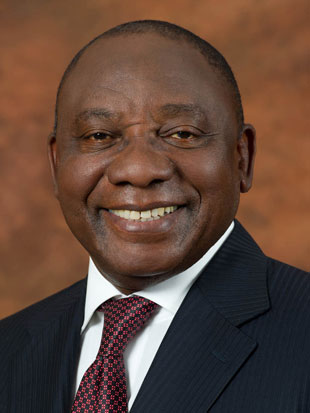
From the Desk of the President
We are making steady progress on economic reform

Dear Fellow South African,
Last week, we released a progress report on Operation Vulindlela, a Government-wide initiative to accelerate progress on economic reform.
This report shows that the economic reform programme is making steady progress, opening the way to more rapid, inclusive and sustainable growth and job creation.
We established Operation Vulindlela in the Sixth Administration to remove the binding constraints that have long held back our economy’s growth: an unreliable energy supply, inefficient rail and ports, high data costs, and a visa system that had deterred investors and tourists.
We have made significant progress since then in clearing these obstacles with a clear view to enhance economic growth. The reduction in load shedding over the past year was supported by the reforms that we introduced to unlock private investment in electricity generation, while reforms in the telecommunications sector have brought down the cost of mobile data. We have reduced the turnaround times for approval processes for water use licences and energy projects, made great progress in clearing the visa application backlog, and expanding the eVisa scheme.
In April this year, we commenced the next phase of Operation Vulindlela to build on these successes and initiate a second wave of reform.
We are moving quickly towards a competitive electricity market, which will introduce greater competition in electricity generation and reduce the chances of experiencing load shedding again.
The reform underway in the energy sector will introduce greater choice for consumers and drive down costs. As part of this process, work is underway to establish an independent Transmission System Operator within the next five years, in line with the Electricity Regulation Act.
We have also made significant progress towards enabling greater investment in our transmission network, including from the private sector, with regulations to govern these investments.
In April, the Rail Infrastructure Manager was established as a separate operating division of Transnet with its own management and reporting structure. It has made capacity available across the freight rail network to private train operating companies and has received 98 requests for access to date.
A revised Network Statement will soon be published and capacity allocated in response to these requests, marking the start of open competition in freight rail. A Private Sector Participation Unit has been established within the Development Bank of Southern Africa to facilitate and fast-track private sector participation in logistics.
A request for information for private sector participation projects in the rail system and ports has received a strong response from the market, and will enable us to mobilise new investment to modernise and expand our logistics infrastructure.
The reform of our visa system is making it much easier for people to visit South Africa and bring much-needed skills and investment while enhancing border security through the Border Management Authority, which we established in the Sixth Administration as part of the reform process. An Electronic Travel Authorisation system has been developed by the Department of Home Affairs and is being prepared to go live in September 2025.
As part of Operation Vulindlela Phase II, we are also reforming the local government system to ensure that basic services such as water and electricity – which are essential for economic growth – are delivered efficiently and reliably.
Several metros have submitted plans for the turnaround of their water and electricity utilities that outline a clear pathway for the ring-fencing of water and electricity services. Progress against these action plans will enable these municipalities to access a new performance-based incentive from National Treasury to drive much greater investment in water and electricity infrastructure.
All of these reforms are designed to boost economic growth and create jobs for South Africans.
The claims by some opposition parties that these reforms represent a form of privatisation are baseless and misguided. The measures we are taking are common sense reforms that will preserve public ownership of key infrastructure while introducing greater competition, dynamism and investment. A number of our peer countries introduced similar reforms, which have powered their economies to higher levels of growth.
Even as the world faces difficult economic headwinds, our economic reform agenda will create the conditions for higher growth and investment, while renewing our infrastructure for generations to come.
With best regards,
Distribution channels:
Legal Disclaimer:
EIN Presswire provides this news content "as is" without warranty of any kind. We do not accept any responsibility or liability for the accuracy, content, images, videos, licenses, completeness, legality, or reliability of the information contained in this article. If you have any complaints or copyright issues related to this article, kindly contact the author above.
Submit your press release